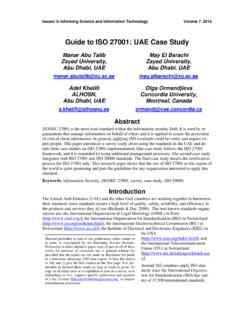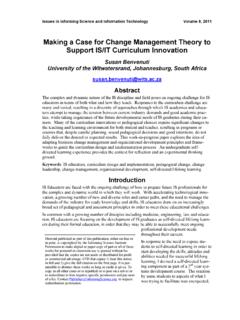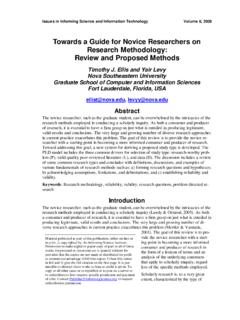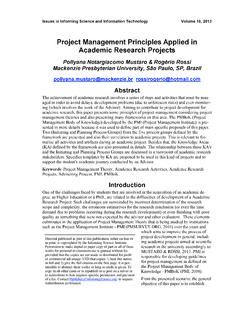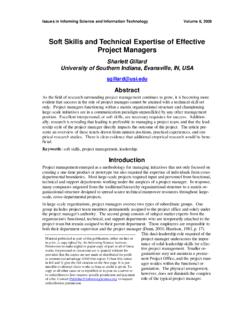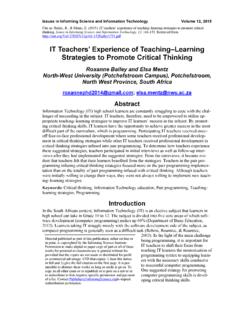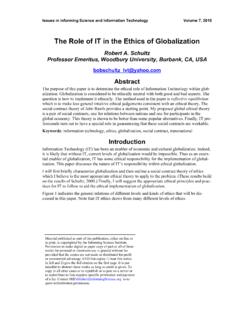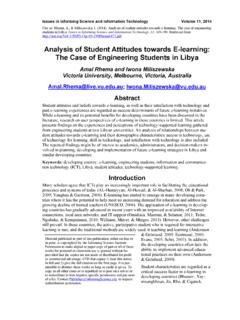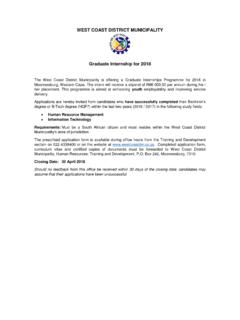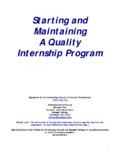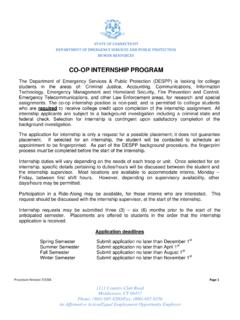Transcription of An Internship Program at a Computer Science Department ...
1 Issues in Informing Science and Information Technology Volume 12, 2015 Cite as: Ali, A., & Smith, D. (2015). An Internship Program at a Computer Science Department Theoretical foundation and overall coordination. Issues in Informing Science and Information Technology, 12, 1- 10. Retrieved from An Internship Program at a Computer Science Department Theoretical Foundation and Overall Coordination Azad Ali and David Smith Indiana University of Pennsylvania, Indiana, PA, USA Abstract Internship courses, unlike others, are multi-pronged because they require coordination at different levels. Typically, a faculty member coordinates the communication and implementation at each level to achieve the desired outcomes. We call the position that this faculty holds the Internship coordinator . For the work of the Internship coordinator to be successful, he/she may need to syn-chronize the work of the Internship with all parties involved. Failure to coordinate at one level or another may affect the work of other parties involved in completing the Internship for the stu-dents.
2 This paper explains the experience of an Internship Program at the Computer Science Department (COSC) at Indiana University Indiana University of Pennsylvania (IUP). We focus on the work of the Internship coordinator for this Program and his work to communicate and coordinate to successfully implement the Internship experience for the students. We first discuss the theoretical foundation that led to the development of Internship programs in academia and then elaborate on the multiple levels of the role of the Internship coordinator in completing the Internship experi-ence for the students. Keywords: Internship Program , Internship courses, Internship at Computer Science programs Introduction Internship courses are different than traditional courses that typically teach and lecture in the classroom. While the emphasis of the both type of courses is still on the learning of the students, the delivery method and the mechanism by which the teaching/learning of the Internship courses is different than other courses (Arnold, 1998, Gault, Redington, & Schlager, 2000, Rieks, Greene, Costa, Flaherty, & Solinger, 2011).
3 Typically, a faculty member at a de-partment oversees the planning and co-ordinating for Internship courses. The position of this faculty member is often called the Internship coordinator . For the work of the Internship coordinator to be successful, he/she needs to connect with different people and coordinate at different levels. The Internship coordi-na tor needs to synchronize the work at all levels to ensure a successful experi-Material published as part of this publication, either on-line or in print, is copyrighted by the Informing Science Institute. Permission to make digital or paper copy of part or all of these works for personal or classroom use is granted without fee provided that the copies are not made or distributed for profit or commercial advantage AND that copies 1) bear this notice in full and 2) give the full citation on the first page. It is per-missible to abstract these works so long as credit is given. To copy in all other cases or to republish or to post on a server or to redistribute to lists requires specific permission and payment of a fee.
4 Contact to request redistribution permission. An Internship Program at a Computer Science Department 2 ence (Robeck, Pattison, Pate, & Patt ison, 2013). This paper explains the experience of a faculty Internship coordinator at the Computer Science Department (COSC) at Indiana University of Pennsylvania (IUP). It begins by giving theoretical background literature review about Internship courses and the different levels of coordination that are typical involved in an Internship course. It then discusses the experience of the Internship coordinator at COSC at IUP. About Internship Courses Internship courses are newer in their formats and delivery methods than traditional in-classroom courses. While both types of courses (in-class and Internship ) share the goal of student learning in attaining their objectives, each use a different methodology to achieve the goal. Traditional courses use the cognitive and lecture style of teaching and learning (Arnold, 1998, Furco, 2002).
5 In this style, the transfer of knowledge goes from the teacher to the student (we call this one directional). The view of a professor sitting on a high podium lecturing to the students in the class while the students take notes is one representation of this kind of teaching/learning. The teaching/learning style of an Internship takes a different approach. Some called this approach Learning by Doing or Learning by Experience (Tooley, 1997) to explain the learning that is taking place during the work of the Internship . Gault et al. (2000) call it structured work experi-ence to emphasize the structured work that the Internship brings and the learning that is taking place through the work. Internship courses still achieve the goal of student learning there is still knowledge gained by the students but the method by which knowledge is gained is different. It is gained through the work experience and whatever goes in the Internship process. Nevertheless, given that the transfer of knowledge is not done directly by the teacher, some consider this new format and delivery method as a deviation from the cognitive style of traditional classroom teaching (Furco & Hol-land, 2004).
6 Internship courses started initially as a recognition of the need to embed a system that helps stu-dents learning through work (Champagne, 2006). This transition from in-class, lecture type learning to learning through experience took a span of years and followed the development of different theories (Casperz, Olaru, & Smith, 2012). Additionally, this type of learning through experience is not limited to Internship courses, instead different course formats are implemented that emphasize learning through experience. Thus we deem an explanation of the development of Internship courses is helpful to our discussion. The remainder of this section explains some of the theories that led to the development of intern-ship and similar courses that implement learning through work . It then discusses the different format of the courses and sheds light on the development of these courses in the Computer Science field. Theories of Learning through Experience An Internship course entails colleges and businesses working together to provide better learning opportunities for the students.
7 Gault et al. (2000) noted that the idea of colleges and business join-ing forces to enhance the professional education Program dates back to the early 1900s when the University of California developed a Program that implemented such partnership. Although this practice may date back to earlier days, most agree that this new pedagogy of learning through experience originated at the dawn of the 19th century (Champagne, 2006, Furco, 2004). In par-ticular, the first of these theories was developed by John Dewey and was called Experiential Ed-ucation or Experiential Learning (Rieks et al, 2011). Kolb, Boyatzis, and Mainemelis (2001) provided an explanation of the Experiential Learning Theory (ELT) in the following: Ali & Smth 3 Experiential Learning Theory (ELT) provides a holistic model of the learning process and a multi-linear model of adult development, both of which are consistent with what we know about how people learn, grow, and develop. The theory is called Experiential Learning to emphasize the central role that experience plays in the learning process, an emphasis that distinguishes ELT from other learning theories.
8 The term experiential is used therefore to dif-ferentiate ELT both from cognitive learning theories, which tend to empha-size cognition over affect, and behavioral learning theories that deny any role for subjective experience in the learning process. (p. 2) Champagne (2006) considers it a new form of pedagogy and credits this pedagogy with promot-ing relations between universities and their communities. The basic premise of Experiential Learning is that as we work on something we will learn from working on it. In other words, the learning is taking place by working on something. Although this is well understood in the indus-try and in the general practices of life, the use of this newer pedagogy changed the ways in which the teaching/learning were taking place in higher education. The introduction of experiential learning as a pedagogy challenged the previous theories of the role of academic institutions. It challenged the cognitive style of teaching thru lecturing that was and still is prevalent in academic classrooms (Furco & Holland, 2002).
9 It also challenged what we called earlier the one-directional method of teaching and learning. With the introduc-tion of this new pedagogy, the question that repeats itself is whether or not it is the role of the university to teach the students the practical application (let them learn by doing). Also what oth-er roles universities play in the learning process. However, others answer skepticism about the value of experiential learning courses through the following points: - The changes in the work environment brought these changes in pedagogy. The work en-vironment is often substantially different than what the students are taught or what they go through in the classroom (Arnold, 1998) - It is the task of academic systems to prepare the students for the work environment (Me-zirow, 1990). - Although there is no direct transfer of knowledge from the teacher to the students in in-ternship courses, the academic institution takes active role in the learning process.
10 Typi-cally mentoring takes place during internships. Internship programs often coordinate with the Internship sites to manage this mentoring and learning process and thus facilitating the learning process (Trede, Mcewen, & Sheehan, 2013) - Experiential learning complements and enhances the learning that takes place in the classroom (Toncar & Cudmore, 2000) Classification of Experiential Learning Courses Gault et al. (2000) explained about three types of experiential learning courses taught in higher education: cooperative extensions, cooperative education (or co-op), and Internship . According to Gault et al. Cooperative extension programs refer to state-sponsored agricultural work experi-ences and are therefore not included in this study (p. 46) . However, the other types of courses are still being used and taught at colleges and universities. In regards to cooperative education courses, Theil and Hartley (1997) noted that students used to take these courses to finance their education.
